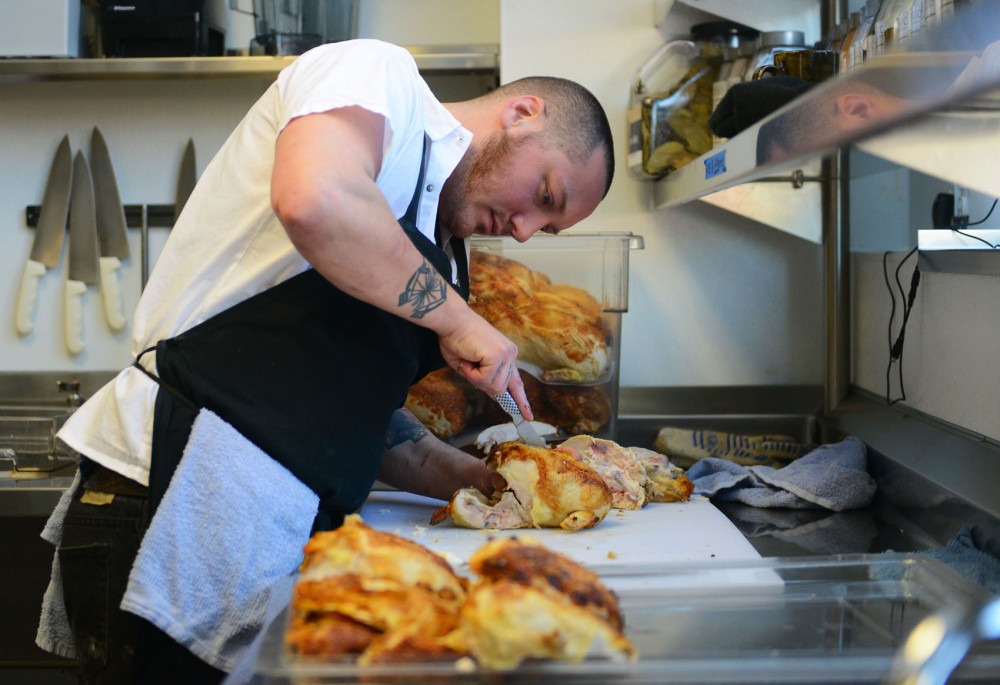The Prairie Tap House stood empty, clean and calm last Saturday morning after a busy Friday night. At about 9 a.m., a few servers began to trickle in to set up for service.
They stocked the tables with condiments, made some coffee and rolled a few napkins while watching Olympic hockey on several large, flat-screen TVs.
Meanwhile, back in the kitchen, a handful of line and prep cooks ran around preparing ingredients for the 350 people who would show up that morning, hungry for brunch.
The cooks had already been there for several hours slicing, dicing, chopping, peeling, sautéing, frying and boiling everything needed for service.
After a six-hour shift, they would make between $50 and $80, depending on their skill level and duties.
Although servers work a slightly longer shift, they could make more than $200 in tips, in addition to their hourly minimum wage.
“One team, one dream? Not so much,” prep cook Cale Nunnelee said. “They say it’s supposed to be like that, but I don’t really think so.”
Though front-of-house workers are the restaurant’s face, their back-of-house counterparts often make less, sometimes juggling multiple jobs to make ends meet.
Mario Salazar works three jobs around town to support himself and his family in Ecuador. He makes $8 and $9 an hour at jobs as a prep cook, line cook and dishwasher.
Although he averages about 40 hours a week, he said his work schedules aren’t consistent. Sometimes, he’ll get called off work if the restaurant doesn’t need him.
“It’s like I keep my feet on different steps all the time,” he said. “If one falls under me, then I can step on the other.”
Dan McAnulty, a line cook at Minikahda Club, has had every job in the back of the house. He started off as a dishwasher because he didn’t have any skills and it was a way to get his foot in the door, he said.
“It takes some time doing the grunt work before you break through,” he said. “It takes a long time to stop being the new guy at a restaurant.”
At the Tap House, Nunnelee makes $14 an hour as a prep cook. He said he would rather work two jobs than take on a salaried executive chef position.
“They’re kind of separated from the actual cooking. They do paperwork, delegate and micro-manage,” he said. “And I don’t want to have to coddle the front of house. Typically, they’re a bunch of babies.”
There are some exceptions to the rule. A few local restaurants, such as Borough, encourage servers and bartenders to tip out the kitchen. At Piccolo, staff members pool tips. However, these practices are fairly uncommon.
Nunnelee said restaurants like Travail and The Rookery, where the chefs are also the servers and bartenders, are doing it right. He gets frustrated when servers explain a dish incorrectly to their guests.
“For as easy as they have it, I don’t know how they manage to mess it up,” he said.
However, he said, he wouldn’t last long in a front-of-house position if he had to deal with impatient, demanding and rude customers.
Nunnelee has wanted to be a chef since he was a boy making French toast with his grandmother. Like most cooks, he wouldn’t put up with the exhausting hours, back-breaking work and low pay if he didn’t have passion for the job.
For someone like Salazar, however, it’s the only option. If he could do anything, he said, he would be a mechanic or work fixing electronics. But he doesn’t have the proper training to get hired in that field.
“It’s a job, and I will work any days,” he said. “If you’re going to pay me, I’m not going to complain.”








